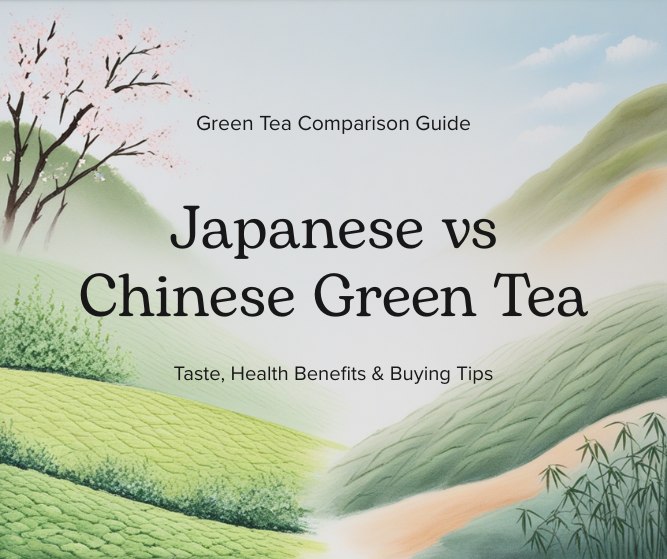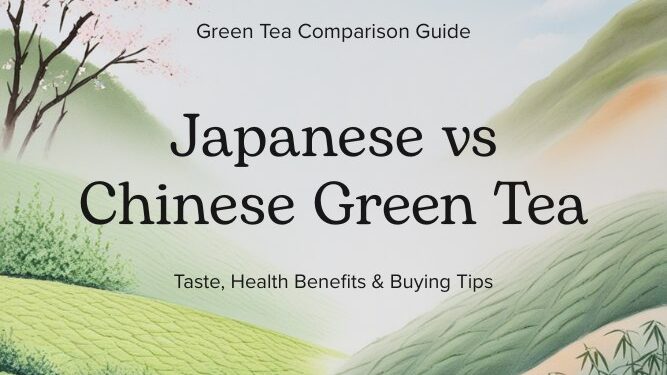
I’ve been drinking green tea for around 20 years (I like to think it’s the reason I still look young), and over time I’ve learned that Japanese and Chinese green teas aren’t quite the same.
What are the actual differences? Is one healthier? And which one should you be drinking?
In this post, I’ll break it all down—taste, health benefits, and what to look for when buying. By the end, you’ll know exactly which green tea belongs in your cup.
Table of Contents
At a Glance: Japanese vs Chinese Green Tea
| Japanese Green Tea | Chinese Green Tea | |
|---|---|---|
| Main Processing | Steamed within hours of picking | Pan-fired / wok-roasted |
| Typical Flavour | Grassy, fresh, umami | Toasty, nutty, floral or light smoke |
| Leaf Colour & Liquor | Bright emerald leaves; vivid green brew | Olive-to-gold leaves; pale yellow brew |
| Antioxidant Trend* | Slightly higher catechins on average | Still rich in catechins, but a bit lower |
| Caffeine / Theanine | Often higher (especially shaded teas) | Moderate caffeine, slightly less theanine |
| Classic Examples | Sencha, Gyokuro, Matcha | Dragon Well, Biluochun, Gunpowder |
| Key Health Benefit | Largely the same—heart, brain & metabolism support (quality matters more than origin) | |
*Matcha (powdered Japanese tea) tops the antioxidant chart because you consume the whole leaf.
How Japanese and Chinese Green Tea Are Made (And Why It Matters)
Both Japanese and Chinese green teas come from the same plant – Camellia sinensis var. sinensis – but the way they’re processed after harvesting makes a big difference in how they taste and what ends up in your cup.
Camellia sinensis var. assamica (the Assam variety) is mostly used for black tea because its higher polyphenol levels make green tea taste too bitter.
Japanese Green Tea
In Japan, green tea leaves are usually steamed right after picking. This stops oxidation quickly and helps preserve that bright green colour and fresh, grassy flavour.
Sencha, one of the most popular types, is a good example of this style. Matcha is also steamed, but then it’s ground into a fine powder and whisked into water, giving it a much stronger, more concentrated taste.
Chinese Green Tea
In China, green tea leaves are typically pan-fired or roasted in hot woks to stop oxidation. This method gives the tea a toasty, nutty, or sometimes smoky flavour. It also changes the colour—the leaves often look more golden or olive green rather than bright green like Japanese teas.
So while the plant is the same, the processing method is what creates those big differences in flavour, colour, and even antioxidant content (which I’ll explain more in a bit).
What Makes Green Tea So Healthy?
Green tea is known for its impressive health benefits, thanks to the natural compounds it contains. While both Japanese and Chinese green teas are healthy, the amount of certain nutrients can vary depending on how the tea is processed.
Key Nutrients in Green Tea
Here are the key nutrients that make green tea so beneficial:
Catechins
These are powerful antioxidants that help reduce inflammation and protect cells from damage. EGCG (epigallocatechin gallate) is the most studied one, and it’s found in high amounts in both Japanese and Chinese green teas.
Steamed teas like Japanese sencha tend to preserve more catechins than pan-fired ones.
Caffeine
Green tea has far less caffeine than coffee but still gives you a gentle energy boost. The exact amount varies, but most cups contain around 20–40 mg.
Japanese teas made from younger, shaded leaves (like gyokuro or matcha) often have a bit more caffeine than sun-grown Chinese teas.
L-theanine
This calming amino acid helps take the edge off caffeine, promoting relaxed focus without the jitters. Japanese green teas, especially shaded ones, are typically higher in theanine than Chinese teas. It’s also one of the reasons Japanese teas can taste smoother and more savoury.
Vitamins & Minerals
Beyond antioxidants, green tea delivers a light boost of essential micronutrients. It supplies small amounts of vitamins (C, E, K, B2, B3) and minerals such as potassium, phosphorus, calcium, and magnesium, plus trace elements like zinc and fluorine.
Why Matcha Is Different
Matcha is made from whole powdered tea leaves, so you’re consuming the entire leaf—not just what’s steeped in water. That means you’re getting more of everything: more catechins, more caffeine, more theanine, and more nutrients overall.
It’s the most concentrated form of green tea, but it also has a strong, grassy flavour that some people find intense. Personally, I need a touch of honey to make it more enjoyable.
Do Japanese and Chinese Green Tea Have the Same Health Benefits?
Yes, when it comes to health benefits, both Japanese and Chinese green teas offer very similar results. That’s because they contain many of the same active compounds, like catechins (especially EGCG), caffeine, and L-theanine, which are responsible for green tea’s well-known effects.
Although some studies suggest steamed Japanese teas may preserve slightly more catechins, and matcha offers a more concentrated dose, both types of tea have been linked to positive health outcomes in research.
Here’s what the science shows green tea can do:
Evidence-backed benefits of green tea:
- Supports heart health – may help reduce LDL (“bad”) cholesterol and improve blood flow
- Boosts brain function – caffeine and L-theanine together can improve alertness, memory, and focus
- Fights inflammation – catechins like EGCG act as antioxidants, helping protect your cells from damage
- May support weight management – green tea has been shown to increase fat oxidation and metabolic rate slightly
- Protects brain health over time – regular intake may lower risk of cognitive decline and neurodegenerative conditions like Alzheimer’s
- May reduce cancer risk – some observational studies link green tea consumption with lower risk of cancers such as breast, prostate, and colorectal (though evidence is mixed)
- Supports healthy ageing – due to its antioxidant and anti-inflammatory effects
Most of these benefits have been observed in populations drinking both types of green tea—Japanese and Chinese—so it’s safe to say that the quality of the tea matters more than where it’s from.
Why It Matters Where Your Tea Is Grown
Not all green tea is created equal—and where it’s grown plays a big role in its quality and safety.
Tea plants absorb whatever’s in the soil and air, including pollution and heavy metals like lead, arsenic, and cadmium. If the tea is grown near busy roads, industrial areas, or polluted farmland, those toxins can end up in your cup.
This is why high-elevation tea grown in clean-air regions is a much better choice. Tea farms in the mountains are often farther away from pollution sources and exposed to cleaner air and water. These conditions not only reduce the risk of contamination but often improve the flavour and nutrient content of the tea as well.
Organic certification can also be helpful, as it usually means the tea is grown without harmful pesticides or synthetic fertilisers. But organic doesn’t guarantee the tea is free from heavy metals—location still matters.
If you want the cleanest tea possible, look for:
- Tea grown in high mountain regions
- Tea from trusted farms or brands that test for contaminants
- Organic teas (especially if combined with clean growing regions)
When in doubt, choose quality over convenience. That dusty green tea on a supermarket shelf may be cheaper, but it won’t compare to a fresh, clean tea from a reliable source.
How to Choose Good Quality Green Tea
If you want green tea that actually delivers on taste and health benefits, quality really matters. Here are some simple tips to help you buy the good stuff—whether it’s Japanese or Chinese.
1. Choose tea grown away from pollution
Look for teas grown in high mountain regions, far from industrial zones and traffic. These are more likely to be free from heavy metals and other contaminants. You’ll usually find this info on the brand’s website or product page.
2. Go for freshness
Green tea doesn’t stay fresh forever. It’s best to buy from brands that harvest and package their tea in small batches and clearly label the harvest year. Avoid teas that have been sitting on supermarket shelves for ages.
3. Check if it’s organic
Organic tea means fewer pesticides and chemicals, which is always a plus. But remember—organic is good, but it’s not the only thing that matters. A non-organic tea grown in a clean, remote area can still be excellent.
4. Read the reviews
Buy from brands that share lab testing results, describe where the tea is grown, and have a solid reputation. If customers rave about freshness and flavour, that’s a good sign.
Brands I Personally Recommend
For Chinese green tea, I highly recommend:
- TeaVivre – their teas are fresh, flavourful, and grown in clean mountainous areas. I reviewed them here and still stand by it.
- Iteaworld – another great source of clean, high-quality Chinese green teas. Their sample packs are great if you want to try different varieties.
For Japanese green tea, some trusted brands include:
- Yunomi – a wide selection of Japanese green teas, directly sourced from small farms across Japan.
- Ocha & Co. – fresh, organic Japanese teas with good reviews and international shipping.
So, Which Green Tea Should You Drink?
Both Japanese and Chinese green teas are good for you. They may taste different and go through different processing methods, but at the end of the day, they offer very similar health benefits—as long as the tea is high quality and grown in clean conditions.
If you prefer a grassy, fresh, umami-rich flavour, go for Japanese teas like sencha or gyokuro. If you enjoy a mellow, toasty, floral or slightly smoky flavour, you’ll probably love Chinese green teas like Dragon Well or Biluochun.
The most important thing is to choose a clean, well-sourced tea that suits your taste—and then make it part of your daily routine.
If you’ve never explored both types, I really recommend trying sample packs. You’ll be surprised at how different they can taste—and how enjoyable it is to find your favourite.
References:
Gui A, Gao S, Zheng P, et al. Dynamic Changes in Non-Volatile Components during Steamed Green-Tea Manufacturing: A Metabolomic Analysis. Foods. 2023;12(7):1551. https://pmc.ncbi.nlm.nih.gov/articles/PMC10094149/
Radeva-Ilieva M, Stoeva S, Hvarchanova N, Georgiev K. Green Tea: Current Knowledge and Issues. Foods. 2025;14(5):745. https://pmc.ncbi.nlm.nih.gov/articles/PMC11899301/
Hu C, Zhang X, Zhan N, Liu Y. Current Status and Health Risk Assessment of Heavy Metals Contamination in Tea across China. Toxics. 2023;11(8):662.
https://pubmed.ncbi.nlm.nih.gov/37624168/
Wang M, Yang J, Li J, et al. Effects of Temperature and Light on Quality-Related Metabolites in Tea Leaves. Food Res Int. 2022;161:111882. https://doi.org/10.1016/j.foodres.2022.111882
Zheng XX, Xu YL, Li SH, et al. Green tea intake lowers fasting serum total and LDL cholesterol in adults: a meta-analysis of 14 randomized controlled trials. Am J Clin Nutr. 2011;94(2):601-610. https://pubmed.ncbi.nlm.nih.gov/21715508/
Koreki A, Nozaki S, Shikimoto R, et al. Moderate green-tea consumption in mid-life and risk of dementia: JPHC Saku Mental Health Study. J Alzheimers Dis. 2025;103(2):519-527. https://pubmed.ncbi.nlm.nih.gov/39772974/
Hodgson AB, Randell RK, Jeukendrup AE. The effect of green-tea extract on fat oxidation at rest and during exercise: evidence of efficacy and proposed mechanisms. Adv Nutr. 2013;4(2):129-140. https://pmc.ncbi.nlm.nih.gov/articles/PMC3649093/
Weiss DJ, Anderton CR. Determination of catechins in matcha green tea by micellar electrokinetic chromatography. J Chromatogr A. 2003;1011:173-180. https://pubmed.ncbi.nlm.nih.gov/14518774/
Ogunleye AA, Xue F, Michels KB. Green-tea consumption and breast-cancer risk or recurrence: a meta-analysis. Breast Cancer Res Treat. 2010;119(2):477-484. https://pubmed.ncbi.nlm.nih.gov/19437116/
Mousavi A, Vafa MR, Neyestani T, et al. The effects of green tea consumption on metabolic and anthropometric indices in patients with Type 2 diabetes. J Res Med Sci. 2013;18(12):1080-1086. https://pmc.ncbi.nlm.nih.gov/articles/PMC3908530/

























